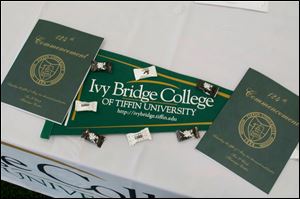
Tiffin University online unit announces abrupt closure
Ivy Bridge offered associate degree programs
8/4/2013
Joan Coressel of Port Clinton studied at Ivy Bridge College, an online school associated with Tiffin University. Ivy Bridge unexpectedly announced this week that it will close Oct. 20. Ms. Coressel will be six credits short of graduating.
NOT BLADE PHOTO

Joan Coressel of Port Clinton studied at Ivy Bridge College, an online school associated with Tiffin University. Ivy Bridge unexpectedly announced this week that it will close Oct. 20. Ms. Coressel will be six credits short of graduating.
At age 51, Joan Coressel thought she had college and career plans figured out. The Port Clinton woman who bartended while raising her children was ready for a new start.

Ivy Bridge College enrolled more than 2,000 of Tiffin University’s 6,900 students last year.
In August, 2011, she enrolled at Ivy Bridge College, Tiffin University’s online associate’s degree division.
Two years later, she had completed 55 of her needed 61 credits with a 3.69 grade point average at a cost of $20,000. She planned to finish in February.
On Thursday she found disconcerting news on Facebook: Ivy Bridge College is closing Oct. 20.
“I was planning on moving after I finished my degree. Well, now I’m in limbo,” she said. “I have no idea what I am going to be doing.”
Ivy Bridge notified students this week via Facebook and email that Tiffin University was discontinuing its degree programs through Ivy Bridge.
The closure is sudden, although Ivy Bridge has been the subject of scrutiny for months. But in response to inquiries from The Blade that began more than a month ago about Ivy Bridge, university officials never indicated it could close.
Until recently, Tiffin University leaders looked to unload Ivy Bridge, which began enrolling students in 2008. Current and former university officials said the plan all along was to gain independent accreditation for the school. That would be enticing to investors, because Ivy Bridge could issue its own degrees, once authorized by the state. Once independent, the school could then be sold and possibly run as a for-profit college.
Tiffin University President Paul Marion said the accreditation proposal was withdrawn after it became apparent it would not be supported by the Higher Learning Commission of the North Central Association of Colleges and Schools. The commission is one of six regional accrediting bodies recognized by the U.S. Department of Education that gives the formal stamp of approval to higher education institutions; it accredits Tiffin University’s programs.
Ivy Bridge’s closure comes amid heightened scrutiny of for-profit colleges and the Higher Learning Commission, which had accredited many of those schools.
“[The Higher Learning Commission] has long been a home base for big for-profits, because of geography and a belief that the commission had a relatively welcoming view of the sector,” a 2013 Inside Higher Ed story said.
The regulatory environment shifted several years after Ivy Bridge started. For-profit colleges faced scrutiny over their large share of Pell Grant usage compared to their market share; most students who attend for-profit schools are low-income and qualify for the federal grant. In 2009 and 2010, the federal government released reports that criticized some for-profit schools for deceptive enrollment practices and possible student aid fraud.
Criticism of for-profits has continued, with a two-year Senate committee audit that blasted the industry for, among other things, aggressive recruitment, poor graduation rates, high tuition, and excessive amounts spent on marketing.
The Higher Learning Commission also faced federal scrutiny, including a 2010 U.S. Department of Education analysis that determined the commission did not have credit hour definitions or minimum program length requirements, which the analysis said could result in inflated credit hours and over-awarding of federal funds.
Original plan
What ended in Ivy Bridge’s failure started as a novel investment idea.
Ivy Bridge formed out of conversations in early 2007 between Cam Cruickshank, then TU’s vice president for enrollment, and Paul Freedman, then an employee of a software company the university used as a vendor. Mr. Freedman had an idea to start an online transfer college, Mr. Cruickshank said, and planned to buy a struggling Cleveland-area college.
The purchase of budget-strapped nonprofit colleges — and their prized accreditations — by companies to turn into for-profit institutions was in vogue at the time.
Mr. Cruickshank said he suggested instead of purchasing a college, Mr. Freedman and he could collaborate on a partnership with Tiffin University. Mr. Freedman formed a company called Altius Education, which would handle the marketing and enrollment for the school. Tiffin would provide the academics.
While much of Ivy Bridge looks typical, some of its operations stand out.
Tiffin University is, like most U.S. higher education institutions, nonprofit. Ivy Bridge operates academically as an arm of TU, but it is controlled by the limited liability company, Altius University, that is registered in Delaware.
Concerns raised
The Blade began asking TU officials about Ivy Bridge after concerns were raised to the paper about how transcripts were issued by the school and its relationship to the university. During repeated inquiries, TU leaders downplayed the effects of its failure to get independent accreditation and never hinted Ivy Bridge could close.
Mr. Marion said college officials received a July 25 letter from the Higher Learning Commission that he said dictated the closure.
Mr. Freedman said the issue was prompted by commission rules that changed after Ivy Bridge’s founding. He said the commission provided a positive review of Ivy Bridge in 2010, but in 2012, TU “reminded” the commission of its plans to seek independent accreditation for the program.
After learning the commission was not likely to support that move, Mr. Freedman said Ivy Bridge was willing to drop it.
But he said the commission had concerns the LLC was not properly approved per their change in rules in 2011.
“Tiffin was told under no uncertain terms that they would face strict sanctions if they did not comply with the directives,” Mr. Freedman said.
When asked weeks ago, a commission spokesman would not comment on any specific decisions about Ivy Bridge. But in a written statement issued Friday, the commission said it initiated a review of Ivy Bridge in 2012.
The commission said a review’s preliminary findings raised concerns about course quality, academic rigor, student retention, and lack of participation by TU in financial decision-making.
The commission said it gave Tiffin University a choice: Resubmit Ivy Bridge for approval or break ties with Altius.
In a Thursday announcement, Altius Education claimed the commission said TU must discontinue offering degrees through Ivy Bridge. Mr. Marion said the difference in the two sides’ explanation is “a little bit of semantics, I suppose.”
Revenue generation
Tuition revenue generated from Ivy Bridge students is deposited in the LLC’s account, then split between Tiffin and Altius, according to a TU spokesman. Full-time tuition for Ivy Bridge is $4,463 per semester this fall, more than twice what an Ohio resident taking 12 credits at Owens Community College would pay.
Both Mr. Marion and Mr. Cruickshank originally cited a confidentiality agreement that precluded them from discussing the financial breakdown of Altius University.
But after the closure announcement, Mr. Marion said Ivy Bridge was a break-even enterprise for Tiffin.
According to tax filings found on GuideStar.org, Tiffin University’s revenue rose from about $35.6 million in 2008 to about $58.8 million in 2011, the most recent year available. But Mr. Marion said that increase is because of efficient operations and the growth of the university’s master’s and bachelor’s programs.
Mr. Marion’s total compensation rose from $320,734 in 2009 to $392,656 in 2011. A university spokesman said that figure is total compensation, not just salary.
In 2008, Tiffin had about 2,700 students. Last year, the school had more than 6,900, according to university figures, with more than 2,000 of those Ivy Bridge students.
Mr. Freedman said Altius raised about $34 million, a “substantial portion” of which supported Ivy Bridge College. He said Ivy Bridge was profitable last year, but that the money was used to pay back investors. Mr. Freedman and his investors provided start-up funds for Ivy Bridge that Tiffin didn’t have.
“This leaves a big hole in our hearts and also probably [our] wallets,” he said.
Tiffin University earlier this year laid off 35 full-time employees and two part-time tutors who worked at Ivy Bridge’s South Toledo headquarters after failing to get independent accreditation for Ivy Bridge, according to a spokesman. Mr. Marion previously said failure to attain independent accreditation would not impact Ivy Bridge’s operations.
Officials said they don’t yet know how many more jobs may be lost because of Ivy Bridge’s closure.
Meanwhile, scrutiny of Ivy Bridge continues from the Ohio Board of Regents. Shane DeGarmo, senior director of program development and approval, said the board received a complaint from another higher education institution earlier this year about Ivy Bridge’s operations and how transcripts were issued.
The complaint said an institution received transcripts from students that were issued by Ivy Bridge College of Tiffin University. Ivy Bridge, however, isn’t authorized to issue its own transcripts.
The board of regents is, by chance, conducting a standard reauthorization review of TU, and Mr. DeGarmo said part of that review now includes inquiries relating to the complaint over Ivy Bridge.
Mr. DeGarmo said he doesn’t think its review prompted Ivy Bridge’s closure.
Officials said Ivy Bridge students have options to finish their degree. Among them: Some may be eligible to transfer to Tiffin University’s bachelor’s degree program. Others may transfer to another college. Ivy Bridge also is working to find one or more institutions to take over the program so students can finish.
Contact Nolan Rosenkrans at: nrosenkrans@theblade.com or 419-724-6086, or on Twitter @NolanRosenkrans.